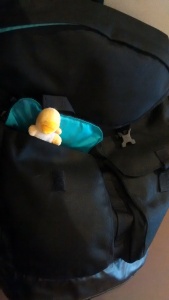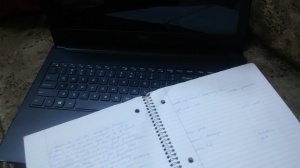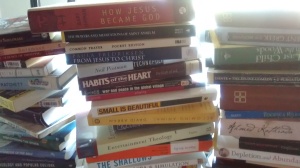This ring still feels strange and a bit uncomfortable, a foreign object. So often, thinking about our future, I have semiconsciously scratched an itch on that fourth finger, yet the weight of it is still a new and unexpected thing. It’s silly, but I really did feel more like we were really engaged after the ring fit and was on me. The most valuable thing you’ve ever owned always glinting at you has a way of reminding you, of making you think.
I know that soon enough I’ll never notice this feeling; it will be like the high school ring on my right hand – also a gift someone sacrificed to put there. I’ve kept it on all this time because I loved my high school; I want to remember where I come from and the serious teenager I was. They are part of me. Now, soon enough, he will be part of me. We have promised to become a family.
 I asked him to marry me, too, and gave him a ring, too. I am proud that it fits and looks handsome on him even though I made it from a thousand miles away. He is hyperaware of his own ring, takes it off when he washes his hands. I like that we are both reminded, both taken, newly conscious, connected somehow by these gifts.
I asked him to marry me, too, and gave him a ring, too. I am proud that it fits and looks handsome on him even though I made it from a thousand miles away. He is hyperaware of his own ring, takes it off when he washes his hands. I like that we are both reminded, both taken, newly conscious, connected somehow by these gifts.
Dating is like one big question, a tightrope of opportunities to fall deeper into a harder, worthier love – and chances to say no. Always that possibility that someone might decide against forever, and the parts of you that have become intertwined will have to be slowly surgically extricated, or else shut up in a locked box labeled “past” that you hardly dare to open. But now we are preparing to cast our foolish lot with a promise that that will never happen, that the days of ‘no’ are behind us. I am glad, in the end, that the months before this moment saw me air a lot of fears, for I know now that I am sure. And I am glad that when the time came, it got to be both of us; we said yes.



 n the mind fails. I cast my lot with the mystics of Christianity – the Pentecostals, Quakers, Charismatics, Eastern Orthodox, the early church and all the holy fools ever to say that God lives and speaks in our hearts with knowing exactly what we could possibly mean.
n the mind fails. I cast my lot with the mystics of Christianity – the Pentecostals, Quakers, Charismatics, Eastern Orthodox, the early church and all the holy fools ever to say that God lives and speaks in our hearts with knowing exactly what we could possibly mean.

